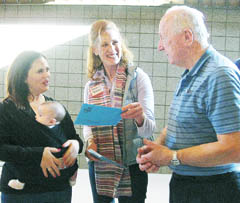
ST. CHARLES—When it comes to dating violence, teens who recognize the “red flags” of danger — like constant blaming, extreme jealously and constantly texting or calling by a boyfriend or girlfriend — can escape and find a safe zone.
That could save their lives, said Jim Kintz, domestic violence and abuse victims’ advocate of St. Peter Parish in Geneva.
Nationwide, one in three teens is a victim of dating violence, he said. But parents can recognize the signs and help divert the danger.
“Understanding what you are witnessing, such as withdrawal from friends and favorite activities by a child, or a dramatic change in grades, may be ‘red flags,’ ” said Cheryl Dalisay, who together with Kintz, and her daughter Kayla, led a conference on the subject, Feb. 6, at St John Neumann Parish in St. Charles.
“Understanding what to do about those ‘red flags’ is important,” said Dalisay.
Father David Peck, pastor of St. John Neumann, opened the conference. He led the gathering in a prayer for victims in abusive relationships, based on Psalm 55, verses 2-3, 13-15, and 17-18.
Suggest other ways
“If your teen thinks something is normal for them, but you recognize that it is not normal, you need to suggest other paths for them,” Dalisay said. “We have to make sure we are creating an environment at home where there is open dialogue.”
Diane Merrick and Kintz helped start the anti-violence program here 15 years ago. Merrick is now a member of the domestic violence commission at St. Katharine Drexel Parish in Sugar Grove.
“I had a history of growing up with domestic violence in my home. Now, I have a passion for education to teach parents, and to teach young women primarily, the difference between love and manipulation,” Merrick said.
“I hope more priests will speak out about this from the pulpit,” she added. “Domestic violence is a painful subject, because in the Catholic Church we traditionally preserve marriage.
“A woman I know of went to her priest and said she was being abused, but she didn’t want to end her marriage. She was told by the priest, ‘You don’t have a marriage.’ And that understanding may have saved her life,” Merrick said.
About 35 teens and adults from around the Rockford Diocese participated in the conference: “Date or Danger — In Their Shoes.”
They viewed dramatic videos of real life stories of teens caught up in tragic activities, and how some managed to avoid catastrophe.
Then, teens and adults went into separate rooms to learn about various scenarios with activities that led them virtually along the footsteps of real life teen victims. Some victims found help in time; some ended up at a funeral home, the true stories revealed.
Learn the signs
Learning the signs of abuse will help parents to assist their teens in making smart decisions that can save a life, Dalisay said.
The abuser often has very low self-esteem, or is into pornography, or has criminal intent, and the victim develops low self-esteem because of the abuse, Kintz explained.
“Abusers look for victims with susceptible personalities such as those who are quiet, very helpful to others and anxious to please, whom the abuser feels they can manipulate. Those kinds of people become victims,” he said.
Laurie Hickman, a member of the Ministry for Victims of Domestic Violence at St. John Neumann, said the program outlines what teens and parents should look for.
“I think this is an absolutely fabulous program for making people aware of what can potentially happen. We are hoping this will make people think, especially young people.
“I think this should be done in every parish and as often as possible,” Hickman said.
Know the people
Perpetrators may be strangers or someone they are dating, or they may be someone they see every day, another mother said.
Social media can be used to bully and abuse, but best of friends don’t demand to know a friend’s Facebook password, and spy on their conversations, she cautioned.
Kintz advises that when there is a problem it should not be discussed on social media, but tackled face-to-face with counselors, pastors, parents or friends of the victim who can offer help.
Kim Cook, RN, and founder of Teen World Anonymous. org, said that she would like to see more programs aimed at trying to help the abusers themselves, who are usually males.
Only 5 percent of victims were found to be male until a few years ago when same-sex relationships became more publicly known. Now those figures show that about 15 percent of victims are male, Kintz said.
One mother said she hopes priests will give more sermons about the matter to assist in the development of healthy families. She urges the diocese as a whole to present more programs to help curb destructive behavior.
That violent behavior affects one in three teens and, for adults, domestic violence contributes to the breakups of many marriages, she said.
Dalisay hopes the program will be held more often in schools and parishes throughout the diocese.














